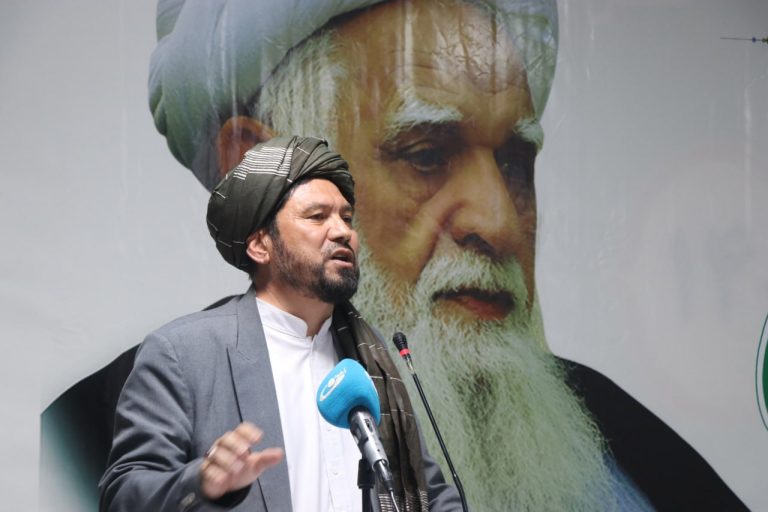In commemoration of half a century of scholarly, cultural, political, media, and social contributions by Grand Ayatollah Mohseni, and marking the sixth anniversary of his passing, this scientific-cultural symposium entitled “Islamic Convergence in the Thought of Grand Ayatollah Mohseni (May He Rest in Peace)” was organized by the Department of Culture, Dawah, and Islamic Guidance of Khatam -Al-Nabieen University in collaboration with the cultural committees of the faculties. The event took place on Thursday, August 7, 2025, in the Abu Rayhan Conference Hall of Khatam -Al-Nabieen University, Ghazni Branch.
The symposium was attended by a broad spectrum of society, including representatives from the Office of Grand Ayatollah Mohaqiq, respected members of the Council of Ulema, mosque imams, seminary students, university professors and students, veterans, school principals and teachers, elders, religious scholars, and other faithful members of Ghazni’s Shia and Sunni communities. The program was conducted in three main sections:
Section One: Quranic Recitation
Participants collectively recited verses from the Holy Quran, dedicating the spiritual reward to the lofty soul of Grand Ayatollah Mohseni (May He Rest in Peace).
Section Two: Lectures and Scientific-Cultural Presentations
This section began with Quranic verses recited by Atiqullah Mohammadi, Deputy of the Council of Ulema. It continued with the screening of the documentary clip “From Jurisprudence to Civilization,” highlighting the ideas and achievements of Grand Ayatollah Mohseni. Speeches followed from Dr. Khadim Hussain Habibi, Chancellor of Khatam -Al-Nabieen University (Ghazni Branch); Hojjat al-Islam Mr. Ghafari, former member of parliament and member of the Afghan Council of Ulema; Hojjat al-Islam Elyasi, head of Fatimah al-Zahra Seminary; and a video presentation of Maulavi Dr. Ebrahimi, a member of the Islamic Brotherhood Council.
Dr. Habibi expressed condolences on the sixth anniversary of Grand Ayatollah Mohseni’s passing and thanked the attendees for their presence. He posed the question of why, after six years, the commemoration continues and answered by emphasizing:
- Honoring great scholars and servants of the community is commendable in all divine religions, particularly Islam. Grand Ayatollah Mohseni is recognized as a comprehensive intellectual and spiritual model for Muslims worldwide.
- His pioneering role in the jihad for national independence and resistance against the Soviet occupation.
- His efforts in fostering Islamic brotherhood among the Muslim Ummah, especially within Afghanistan’s diverse communities, making him a foremost advocate of Islamic unity and solidarity.
- His struggle to advance the political and social status of women in Afghanistan, paving the way for their participation in public affairs.
Mr. Ghafari, whose speech was broadcast via LCD screens, highlighted Grand Ayatollah Mohseni’s significant scientific, cultural, and media contributions. He discussed Mohseni’s critique of the Universal Declaration of Human Rights and his vision for rewriting this declaration to shape a new civilization.
Hojjat al-Islam Elyasi, in his address, expressed condolences on the anniversary and spoke on the political and social role of women in Mohseni’s thought, emphasizing that Islam supports women’s participation in political and social arenas, provided Islamic principles and modesty are observed.
Maulavi Dr. Abdul Qadir Ebrahimi, whose remarks were also broadcast, described Grand Ayatollah Mohseni as one of Afghanistan’s most exceptional scholars who worked tirelessly for coexistence, mutual acceptance, and brotherhood in a context where sectarian divisions were exploited by adversaries. Mohseni countered these threats through scholarly works, establishing the Islamic Brotherhood Council, and organizing numerous seminars.
Section Three: Academic Panel Discussion
The concluding segment featured a scholarly panel moderated by Mr. Fetrat, the event’s host and secretary. Discussion highlights included:
- Professor Asghari, head of the Tawhid Seminary, underscored the importance of publishing the “Compendium of Authentic Hadith” as a monumental achievement in Hadith studies. He elaborated on the significance of Hadith within Islamic civilization and highlighted Mohseni’s decade-long meticulous effort in collecting and authenticating approximately 12,000 hadiths out of over 400,000 narrations.
- Maulavi Saadat Khan addressed the topic of Islamic unity and rapprochement among sects in Mohseni’s thought, referencing the Quranic verse “And hold firmly to the rope of Allah and do not become divided.” He emphasized that unity is an essential duty, while scholarly differences promote intellectual growth.
- Karimi, Scientific Deputy of Khatam -Al-Nabieen University (Ghazni Branch), discussed the concept of freedom in Mohseni’s view, highlighting its foundational role in human rights and societal development. He outlined different types of freedom—ontological, spiritual, ethical, and political—as elaborated in Mohseni’s work A Visual Image of Islamic Governance.
- Maulavi Qureshi, Islamic Culture instructor at Khatam -Al-Nabieen University, analyzed the causes of division within the Muslim Ummah from Mohseni’s perspective, categorizing them into ethnic, political, and sectarian divides. He stressed that sectarian differences are scholarly and juristic in nature and become problematic only when they foster hatred and bigotry. He called for transcending sectarianism towards an inclusive Islamic identity and urged attention to global issues like Palestine.
The symposium concluded with prayers led by Hojjat al-Islam Mubaligh, head of Baqir al-Uloom Seminary.
This symposium stood as a tribute to the scholarly legacy and unifying vision of Grand Ayatollah Mohseni (May He Rest in Peace), a luminary who charted new horizons for Islamic convergence, coexistence, and civilization for present and future generations

